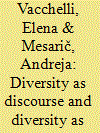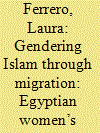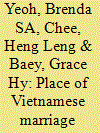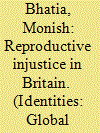|
|
|
Sort Order |
|
|
|
Items / Page
|
|
|
|
|
|
|
| Srl | Item |
| 1 |
ID:
179525


|
|
|
|
|
| Summary/Abstract |
The paper critically examines the way diversity is conceptualised as a dominant discourse and as a paradigm for understanding the present, which has gradually replaced multiculturalism in academic and policy discourse. Using our interviews with third sector practitioners providing mental health support to a wealth of migrant populations in London, the paper offers key examples of how TSOs (Third Sector Organisations) address migrant women’s diverse needs, showing how diversity is practised in the everyday of community groups. This paper’s novelty consists in exposing overlaps and divergences between diversity discourses and diversity practices and its added value lays in the combination of academic and practitioner perspectives in the study of TSOs supporting migrant, refugee and asylum seeker women in London.
|
|
|
|
|
|
|
|
|
|
|
|
|
|
|
|
| 2 |
ID:
160376


|
|
|
|
|
| Summary/Abstract |
Italy is the first European arrival country for many Egyptian migrants. A first wave of Egyptian male migrants in Italy was followed by a family reunification phase, with the result that the number of Egyptian women increased in the last decades. Studies of their diasporic experience, nonetheless, are still rare. In particular, analysis of women’s relationship with Islam is needed. Building on the anthropological work which has recently showed how the everyday constitutes a useful analytical category in relation to Islam, the aim of this article is to describe and analyse women’s activities in a mosque in Turin during the years 2011–13. I argue that the role of religious spaces in the context of emigration goes beyond the religious sphere, and women’s participation should therefore be understood from a dual perspective: religious and spiritual, on the one hand, and social and cultural, on the other. The description of women’s everyday practices in religious space allows for a reflection on how migration shapes new Islamic identities that are co-constituted with morality, secularism and displacement. The article contributes to the debate on ‘everyday Islam’ by showing that the effects of migration on the religious experience, far from being homogeneous, can encompass both normativity and resistance.
|
|
|
|
|
|
|
|
|
|
|
|
|
|
|
|
| 3 |
ID:
126989


|
|
|
|
|
| Publication |
2013.
|
| Summary/Abstract |
Scholarship at the development-security nexus has called for greater attention to space to better understand grounded encounters with security and insecurity. Through an examination of embodied engagements with space, this paper details the way migrant women in Southeast Turkey experience security and insecurity in their day-to-day lives in regards to gendered violence. Against the backdrop of state investment in gendered development as a mechanism of conflict mitigation, the reach and mobility of women in and across new spaces in the city has grown. At the juncture between these spaces - the classroom, courtroom, and home - lie conflicting narratives about nation, community, and family that pose implications for the physical well-being of women. To this end, interviews with migrant women and development administrators and teachers suggest that (human) security be understood as embodied and relational, experienced differentially across time and space.
|
|
|
|
|
|
|
|
|
|
|
|
|
|
|
|
| 4 |
ID:
126240


|
|
|
|
|
| Publication |
2013.
|
| Summary/Abstract |
While the literature on 'global care chains' has focused on the international transfer of paid reproductive labour in the form of domestic service and care work, a parallel trend takes the form of women marriage migrants, who perform unpaid labour to maintain households and reproduce the next generation. Drawing on our work with commercially matched Vietnamese marriage migrants in Singapore, we analyse the existing immigration-citizenship regime to examine how these marriage migrants are positioned within the family and nation-state as dependants of Singaporean men with no rights to work, residency or citizenship of their own. Incipient discussions on marriage migrants in civil society discourse have tended to follow a 'social problems' template, requiring legislative support and service provisioning to assist vulnerable women. We argue for the need to adopt an expansive approach to social protection issues, depending not on any one single source-the state, civil society and the family-but on government action to ensure that these complement one another and strengthen safety nets for the marriage migrant.
|
|
|
|
|
|
|
|
|
|
|
|
|
|
|
|
| 5 |
ID:
190764


|
|
|
|
|
| Summary/Abstract |
This article aims to show how race, gender, class, and other identity markers intersect to oppress, control and discipline poor and illegalized single migrant mothers and pregnant women from the Global South. The article draws on evidence from three ethnographic studies conducted between 2008 and 2017 to shed light on the predicaments of mothers and pregnant women excluded from the welfare safety-net, who were flying under the radar due to the fear of deportation. It shows how (cr)immigration controls render women vulnerable to victimization and harm. The second part of the article addresses imprisonment and punishment, treatment by the criminal justice system, and separation from children placed in foster care. The evidence strongly suggests that controls in Britain disrupt the core principles of reproductive justice, including reproductive autonomy and health, and to parent children in a safe and healthy environment without fear of retaliation from the government. This is being termed as racist-gendered state violence.
|
|
|
|
|
|
|
|
|
|
|
|
|
|
|
|
|
|
|
|
|